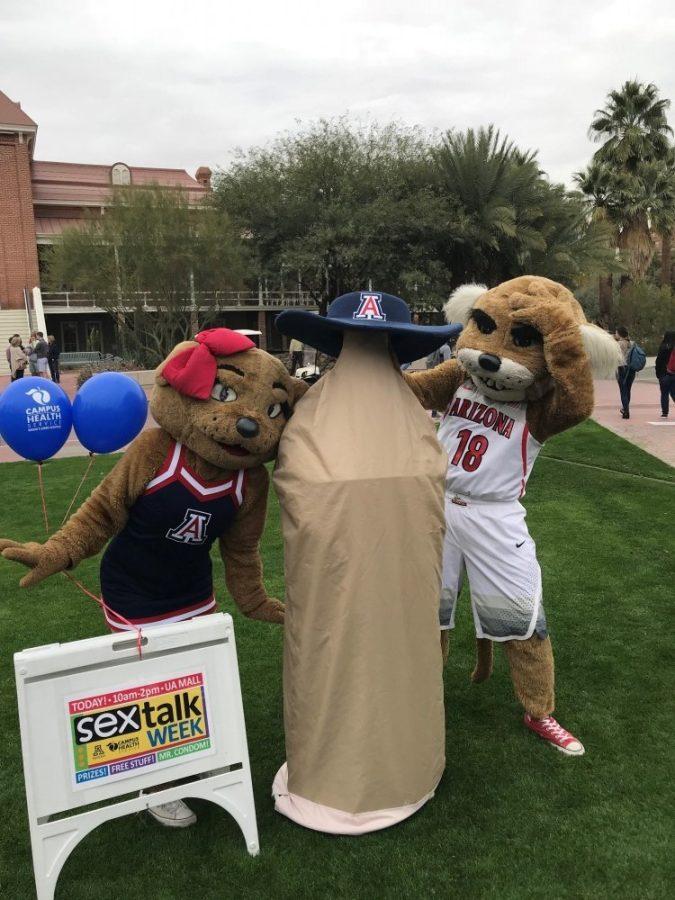Roses are red, violets are blue, Valentine’s Day is coming and the birds and bees talk is, too.
The University of Arizona Campus Health Service is hosting their annual SexTalk Week, providing students various resources to their sexual and relationship health through eight programs and events from Feb. 11 to 15.
Senior Campus Health Educator Carrie Johnson, who has been coordinating SexTalk Week since 2010 when she joined, said Campus Health has promoted the program for decades.
“[SexTalk Week] has always been the week of Valentine’s Day; seems fitting,” Johnson said.
RELATED: UA Health Sciences holds first LGBTQ symposium and community fair
Johnson said the event was originally called National Condom Week in 1988, when the goal was “reducing the incidence of unintended pregnancy, sexually transmitted disease and AIDS by increasing the proportion of sexually active 18-to-24-year-olds who use condoms correctly and consistently.”
Since then, Johnson said it has grown into a more comprehensive program and been rebranded to “SexTalk Week,” a name that is also connected to their weekly Q&A column in the Daily Wildcat that was started in 1995.
“The mission of SexTalk Week is to encourage healthy choices, promote sexual responsibility and healthy relationships and provide accurate and comprehensive sexual health information to the UA community,” Johnson said. “We want the programs and events of the week to reflect the different aspects of SexTalk Week’s mission, so we try to include a mixture of topics.”
According to Johnson, an estimated 700 to 1,200 students participated in the past, with their most popular events being the annual SexTalk Resource Fair, which will take place this year on Wednesday, Feb. 13, on the UA Mall, and Free Condom Friday, which is held every week on Fridays in Campus Health.
Campus Health works with both on- and off-campus organizations to practice as much inclusivity as possible.
According to Johnson, Campus Health is collaborating with the Pima County Health Department to bring a mobile clinic out to the event for free STD testing to students and has presentations from the UA Women and Gender Resource Center’s FORCE and SPEAC.
The Creepy or Cute workshop is part of a larger internship program out of the Women and Gender Resource Center that has Students Promoting Empowerment and Consent and provide outreach for sexual violence prevention.
The workshop, which is on healthy relationships, will be held Thursday, Feb. 14, in the WGRC.
Grace Liatti, SPEAC peer facilitator and a part of the Creepy or Cute program, said the workshop will present a range of scenarios that can be found in relationships and ask the audience if they’re appropriate or not.
“We try not to have examples that are too black and white,” Liatti said. “We kind of want them in the gray area to help people think about ‘Well, could this be creepy or could this be cute’?”
Liatti said that a lot of their programs dive deeper into serious topics from toxic masculinity to victim-blaming, where their conversations can get “heavier.” However, Creepy or Cute is a lighter, more fun presentation that still gets the message across.
“We want people to think critically about things that are appropriate or if they’re comfortable with them in their own relationships … just learning about consent and trust and respect and communication,” Liatti said.
Liatti said SPEAC’s goal is to promote healthy relationships and consent to the larger community, as well as to create a safe campus for everyone to be able to succeed and be comfortable.
“We try and give that message to all of our audience members that, you know, it takes effort of everyone to be able to make a cultural change and help eradicate sexual violence,” Liatti said.
Liatti has never participated in SexTalk Week before but says she is hoping there will be a lot of student engagement and more people will walk away with clear ideas on the consent and communication in a healthy relationship.
“I think that this is a presentation that can be widely viewed by anyone whether people are in relationships or not,” Liatti said. “When they see the presentation, it’s still good that they do for possible future relationships or reflecting on past ones, or being able to look at the relationships they see around them.”
Other SexTalk Week events include LGBTQ and gender spectrum support groups from 3 p.m. to 4 p.m. in Campus Health and SexTalk from 3 p.m. to 5 p.m. in Campus Rec, both taking place Monday, Feb.11.
Tuesday, Feb. 12, there will be a community conversation on abortion from 6 p.m. to 7 p.m. in the WGRC and “Cooking with Cupid,” a $7 cooking class to make and eat recipes from 5:15 p.m. to 6:30 p.m. in Campus Rec.
There will also be giveaways, prizes and more information located in the Campus Health Center, Student Union and Campus Rec and on the Mall.
Johnson spoke about the misconception that college students are viewed to be more sexually active than they actually are, but it does not mean that all students are abstinent.
“Students who are sexually active, or are going to be sexually active in the future, need and should have access to accurate and comprehensive sexual health education,” Johnson said.
Follow Mekayla Phan on Twitter








